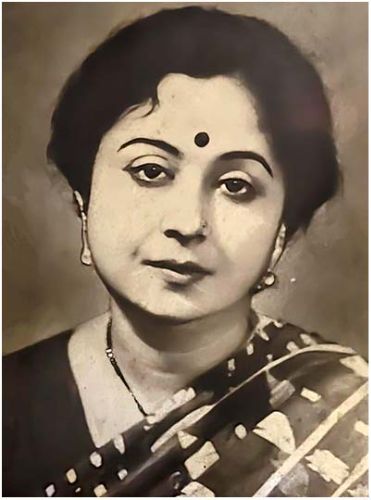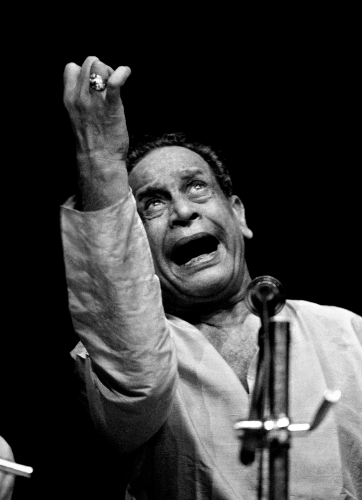Ashima Mukherjee

Subscribe to read full article
This section is for paid subscribers only. Our subscription is only $37/- for one full year.
You get unlimited access to all paid section and features on the website with this subscription.
Not ready for a full subscription?
You can access this article for $2 , and have it saved to your account for one year.
- Born: 7 October 1937 (Comilla, Bengal Presidency, British India)
- Died: 20 February 2024 (Kolkata, West Bengal)
- Primary Cinema: Bengali
- Parents: Sushama Ray and Badanya Kr Ray
- Spouse: Dilip Kumar Bhattacharya (divorced), Partha Mukherjee
- Children: Pompy Bhattacharya
Breaking barriers in a male-dominated industry, Ashima Mukherjee (also known as Asima Bhattacharya) defied convention by not only becoming a singer but also an accomplished composer, film producer, and distributor. Her remarkable achievements paved the way for future generations of women in music and film, cementing her legacy as a true trailblazer. Excelling in both composing and singing, she effortlessly switched between genres. She crafted classical masterpieces and romantic tunes with ease, and her versatility shone in various genres, from composing poignant numbers like Boro eka laage to singing classical pieces like Barkha ritu. She is known for the films Bagh Bondi Khela (1975), Chowringhee (1968) and Mem Saheb (1972). Amongst the numerous honours that she received include the Critic's Council award for contribution to music, the Pride of Region award from Ramakrishna Mission Golpark, and the Sangeet Mahasamman award from the state government.
Born on 7 October 1937 in Comilla, undivided Bengal, she was the youngest of five children born to parents Badanya Kumar Ray and Sushama Devi. Music was a part of her life from the very start and she was reportedly just two when she started to learn music from her mother and sisters. At age three, she sang at a public concert for the very first time, thereafter winning a music competition at the age of five for which she was awarded a gold medal by the Maharaja of Malda, Shri Jagadish Chandra Ray.
Her father being a deputy magistrate, the family moved to Suri on his transfer there. Completing her schooling in Suri and Bankura, she graduated from Brabourne College and earned her master’s degree in Bengali from Calcutta University. Learning music at the Bengal Music College, she studied under teachers like Nanigopal Bandopadhyay, Shaktimoy Paul, Himaghna Ray Chaudhuri, Chitta Ray and Chinmoy Chattopadhyay. Completing a five-year course in light music and semi-classical music, she secured a first class first position and gold medal and was also awarded the title of ‘Gitaprabha’. She would hone her skills in classical music under Pandit Jnan Prakash Ghosh and light music under Sailen Mukherjee. She had the opportunity to develop her singing voice under the expert tutelage of Kamal Dasgupta and Pankaj Kumar Mullick, albeit for a brief period.
Shortly after her marriage to businessman Dilip Kumar Bhattacharya, she joined the All India Radio in 1960. Her first record where she sang under the music direction of Sailen Mukherjee and lyrics of Pabitra Mitra would be released by HMV that very year. She, along with her husband, established the production house Pompy Films named after their only child. Ashima made her entry as a playback singer for their debut film production Dolna (1965) directed by Parthapratim Chowdhury. Her debut film song Putul raja putul rani was picturised on Madhuchanda Chakraborty (of Sara Akash fame). Starring Tanuja in her second Bengali venture, Dolna was based on a very progressive theme. It revolved around the societal pressure faced by an unmarried girl who wants to adopt an abandoned baby. Although Dolna did not fare well at the box office, the Lata Mangeshkar song Amar katha shishir dhnowa (composed by Sailen Mukherjee) from the film still rings in the mind of music lovers.
In 1968, she emerged as a music composer for Pompy Films’ second production, the feature film Chowringhee. Based on the eponymous bestseller by novelist Shankar, Chowringhee, directed by Pinaki Mukherji, starred Uttam Kumar, Subhendu Chatterjee, Supriya Choudhury, and Anjana Bhowmik. A drama genre film, it centred around Sata Bose, the receptionist of Hotel Shahjahan and other crew members, who work hard to make the hotel the first choice of the upper class for socialising in Calcutta. The plot revolved around multiple characters - hotel employees to page three personalities, dealing with various human emotions and problems. This film marked the first of Mukherjee’s collaborations with Uttam Kumar. She initially wanted to procure the services of Sachin Dev Burman for the film, but somehow talks with the noted composer did not materialise. Undeterred, she took on the challenge of composing music herself, resulting in two timeless classics. The iconic song Boro eka laage ei andhaare was sung by Manna Dey for Uttam Kumar, while Hemanta Mukherjee lent his voice to another hit Kachhe robe for Biswajit. Notably, she also contributed a humming conclusion to the latter number, perfectly complementing Hemanta Mukherjee's distinctive baritone.
However, problems arose during the filming of the song Boro eka laage ei andhaare, when director Pinaki Mukherjee rejected the song outright, even refusing to include it in the film. She was heartbroken, but Uttam Kumar reassured her, and the song ultimately went on to become a landmark in the history of Indian film music.
Her 1972 film, Mem Saheb, helmed by Pinaki Mukherjee once again, showcased her talents as a producer, music composer, and playback singer. The producer had initially considered Suchitra Sen for the leading role in this film. However, after a few discussions, the legendary actress declined the offer, feeling unsuitable for the part. The story was based on the bestseller novel of the same name by Nimai Bhattacharya. Starring Uttam Kumar and Aparna Sen in the lead, the film combined the political world and romance of that period. It revolved around a young, educated professor, who falls in love with a journalist. While both stand for each other, their dream of a happy future is cut short by political violence. This film, despite its romantic elements, brought the ethics of journalism to the big screen. Mukherjee’s soulful voice in Bodhu emono badalo was a poignant expression of longing. Her other memorable songs from the film include Emon sondhay aakashe and her duet Aaj bujhi pakhira with Manna Dey. The film won the Filmfare award (East).
Bagh-Bondi Khela (1975), her next production, starred Uttam Kumar, Supriya Choudhury, Partha Mukherjee and Samita Biswas in key roles. The plot centered around a ruthless politician and human trafficker Bhabesh, who wishes to stand for the elections and, in order to reduce his declarable wealth, gifts his money to his son. Her collaboration with Uttam Kumar resulted in the superstar portraying diverse characters: a lonely hotel receptionist in Chowringhee, a journalist in Mem Saheb, and a ruthless businessman turned aspiring politician in Baghbandi Khela. Uttam Kumar shared a close bond with Mukherjee, considering her second husband Partha Mukherjee as his brother.
The cultural heritage of Bengal is incomplete without the iconic Mahishasura Mardini broadcast on Mahalaya, a tradition that continues to resonate with Bengalis worldwide. Every year, the much-revered programme sets the tone for Durga Puja, filling homes with the divine chants and hymns of chandipath, echoing through the streets and awakening the spirit of the festival. Mukherjee’s association with Mahishashur Mardini is one of her most notable achievements. She featured alongside co-singers Shyamal Mitra and Arati Mukherjee in the song Shubhro shankha robe.
This legendary radio programme, composed by Pankaj Mullick, scripted by Bani Kumar, and masterfully chanted by Birendra Krishna Bhadra, was an annual fixture for Bengalis for over four decades, until 1976, when a controversial government directive went on to replace the original lineup with prominent stars like Uttam Kumar and Hemanta Mukherjee. Although some renowned singers like Lata Mangeshkar, Asha Bhosle, and Manna Dey joined the roster in addition to most of the earlier singers, the public outcry was so immense that All India Radio was forced to revert to the original programme the very next year.
Despite Uttam Kumar's minimal involvement (a mere three-four line voiceover), the new Mahalaya programme Debi Durgatiharinim was unfairly attributed to him, and its failure was partly blamed on him. Mukherjee was deeply hurt by this, as she had played a significant role in convincing Kumar to participate in the programme, which also marked the superstar’s radio debut. In reality, Debi Durgatiharinim featured a talented ensemble of narrators, like Dhyanesh Narayan Chakraborty, Gobinda Gopal Mukherjee, Basanta Choudhury, Partha Ghosh, Pradip Ghosh, Chhanda Sen, and Gouri Ghosh, who did most of the voiceovers.
This incident was depicted much later in the 2019 Bengali film Mahalaya, which highlighted the controversy, starring Jishu Sengupta and Subhasis Mukherjee in the roles of Uttam Kumar and Birendra Krishna Bhadra respectively.
Some of the other films that she composed for are Kancher Dewal (unreleased), Ajker Nayak (1972), Binoy Badal Dinesh (unreleased), Phulshajya (1977), Shubho Rajani (1982), Tanaya (1983), Nishantay (1985), Abasheshey (1985), and Dabar Chal (1987).
Mukherjee’s compositions were brought to life by renowned singers like Manna Dey, Hemanta Mukherjee, Sandhya Mukherjee, Ajoy Chakrabarty, Swapna Dasgupta, and Sriradha Bandopadhyay. In addition to her film and radio work, she also composed music for teleserials like Saat Kahon and Parineeta. She was a versatile artist who sang songs composed by prominent music directors like Hemanta Mukherjee, Kalipada Sen, Anil Bagchi, Sailen Mukherjee, and Jatileswar Mukherjee. During one of her visits to Bombay, Mukherjee impressed composers Laxmikant-Pyarelal with her singing, but they advised her to relocate to the city to be considered for singing opportunities in Hindi films. Her playback singing credits include films like Pratidan (1969), Mem Saheb (1972), Aaranyak (1973), Ek Bindu Sukh (1977), Shubho Rajani (1977), and Tanaya (1983), showcasing her talent in both composition and vocal performance.
Mukherjee was a multifaceted film industry professional who not only produced films but also distributed some of them under her banner, Debali Pictures. Some notable films distributed by her include Joradighir Chowdhury Paribar (1966), Dolgobinder Karcha (1966), Teer-Bhumi (1969), and Pratidan (1969), among others.
In the mid-1990s, she collaborated with her husband Partha Mukherjee to create a television serial called Swapner Gaan, Swapner Gayak for Doordarshan, which was centered around the life and creation of legendary singer Manna Dey. The show, which consisted of around 30 episodes, was broadcast in 1996. Additionally, she started a tradition of publicly celebrating the birthday of renowned singer, composer, and producer Hemanta Kumar Mukherjee on 16th June, starting in 1975. The inaugural celebration was held at Kolkata's Birla Academy and was attended by prominent figures of the time.
As a composer of Akashvani, she had the privilege of working with several legendary singers and musicians of Bengal. Enjoying a long and fulfilling career at All India Radio Kolkata for nearly two decades, she served as light music producer; later, she was promoted to the post of assistant station director. In 1989, she was selected for training in music in Germany along with 11 other members from various radio stations around the world.
Mukherjee passed away aged 86 at her Kolkata residence, on 20 February 2024. CM Mamata Banerjee took to X (formerly Twitter) to say that her death was “an irreparable loss to the music world”. Her granddaughter, Niharika Bhattacharya, who has followed in her footsteps, said, “My grandmother was always ahead of her time. That’s why she got the courage to go against the so-called norms of society. She was always a career woman who maintained a balance between home and work.”
Mukherjee sadly left behind no autobiography or memoir of any sort; many of her songs or compositions are not even available in the public domain, and the prints of her debut film Dolna are untraceable. With her passing, Bengal lost a rare breed of talent. And so, despite the passage of time claiming many of her works, her legacy would hopefully endure. Her art would continue to captivate audiences through her surviving films and songs, and every year, on the auspicious dawn of Mahalaya, her memory would get revitalised, ensuring her impact on Bengali culture remains indelible.
References
(Information and image courtesy: Pompy Bhattacharya and Abir Bhattacharya)
Additional sources:
https://www.kolkatakonnect.com/2024/02/renowned-singer-composer-producer.html







.jpg)



